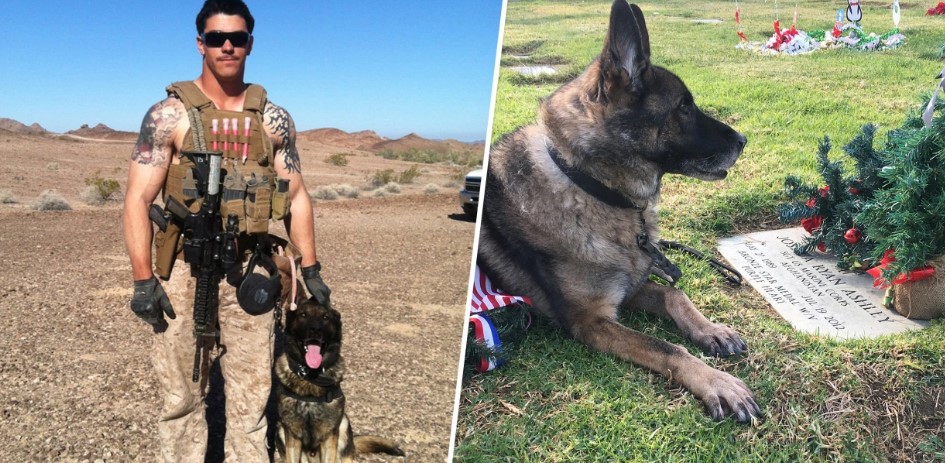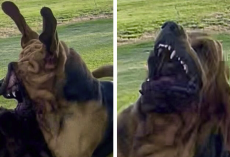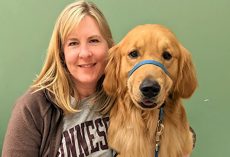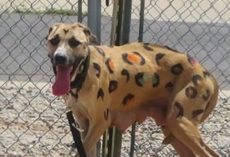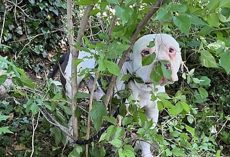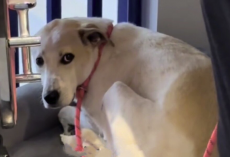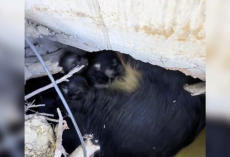The story of Army Ranger Briggs, who is tasked with transporting Lulu, a military working dog, to the funeral of Lulu’s handler, is told in the 2022 comedy-drama film “Dog,” starring Channing Tatum. But “Dog” is more than just a movie to Tammie Ashley, a California mother of three; it’s the tale of her family.
Ashley’s son, Marine Sgt. Joshua Ashley, a military dog handler, was murdered in 2012 after being struck by an IED while leading a patrol out of Zombalay Village in the Helmand Valley of Afghanistan. He was 23. Sirius, his dog, lived.
“They came and knocked on my door, just like you see on television,” Ashley told TODAY Parents via phone. “I couldn’t even concentrate. I felt like I was going to throw up. It was to the point that my oldest son had to tell them to stop talking.”
Where I go, my dog goes is a command that military handlers must memorize. Joshua promised his sergeants before he passed away that he would eventually adopt Sirius and bring him home because his dog was his best buddy, partner, and another half.

Ashley made preparations to bring Sirius home, the last surviving part of her son, just a few weeks after he passed away.
“Sirius was so young, so we chose as a family to let Sirius continue to serve,” Ashley explains. “I didn’t want to bring him back home just to sit in the backyard. So he continued to serve and did another deployment.”
A hero’s homecoming
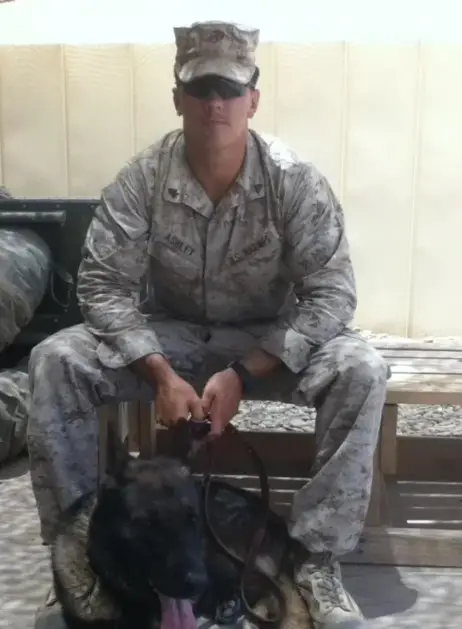
In February 2016, after his second deployment, Sirius was allowed to go home to Ashley and her family.
“They did a wonderful job at Camp Lejeune — they did an actual retirement ceremony for him,” Ashley said. “As soon as I signed the paperwork to get him, we ended up taking him to Dunkin Donuts to eat some donuts. Then we came back to Camp Lejeune to let everybody say goodbye.”
Ashley said that bringing Sirius home brought up a lot of emotions — pain, joy, sadness, comfort.
“I did a lot of crying. I’d tell Sirius I wish he could talk, so he could tell me about my son,” she added. “But our city was wonderful — there were hundreds of people waiting at the airport, and they escorted us home with him. So it was a really big hometown welcome.”
“I had Marines there to help me — dog handlers to help me — with the transition of bringing him in. They stayed with me for the first day,” Ashley explained. Like many retired military dogs, Sirius had a bit of anxiety and did not like other dogs.
“I always kept an eye on him any time there were fireworks or stuff like that around him, because he would get very timid,” she explained. “He’d get very scared.”
Saving each other
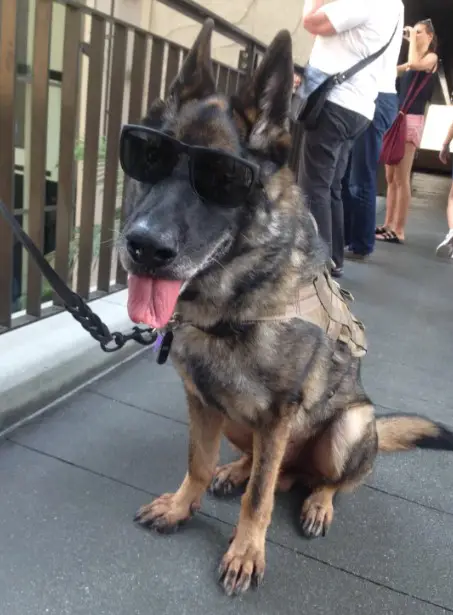
Following his second deployment, Sirius had a kennel injury. The majority of his mouth was hurt, and the pricey treatment involved placing metal plates in his mouth.
“Honestly, they would have probably put him down if he wasn’t promised to a Gold Star mom,” Ashley explained. “They spent thousands of dollars in getting him well enough to be sent home to me.”
In no uncertain terms, Ashley saved Sirius. And she said Sirius saved her.
“For me, it was comforting for me,” she said. “Josh never had children. Sirius was his baby. Handlers are the ‘daddies’ of those dogs. Just having him there and knowing he was part of Josh helped me.”
The fact that he couldn’t bite provided comfort to the military sergeants who were concerned that Sirius would struggle to adjust to “normal” life, but it also meant that he needed ongoing care.
“I was liquifying his food and would blend it every day,” Ashley said. “I had been doing everything for him. He was having problems with his hips and his back. He was doing acupuncture; using CBD drops; I moved to a one-level story home and sold my car and got a car that I could put him in.”
As time went on, it became clear that Sirius was suffering.
“For six months, we would go for walks and I would have to pick him up,” she said. “It got the point that Sirius wouldn’t know that he was relieving himself in my house.”
Ashley told her oldest son about Sirius, and he came over to help care for Sirius at night so Ashley could sleep.
“The next morning he told me, ‘Mom, I don’t know how you’re doing this,'” she added. “‘Sirius falls and drops and is having a hard time just going to the bathroom.'”
Ashley talked to her son about what to do, and they ended up calling the vet. It was time to let Sirius go so he could finally be with his dad.
Saying goodbye
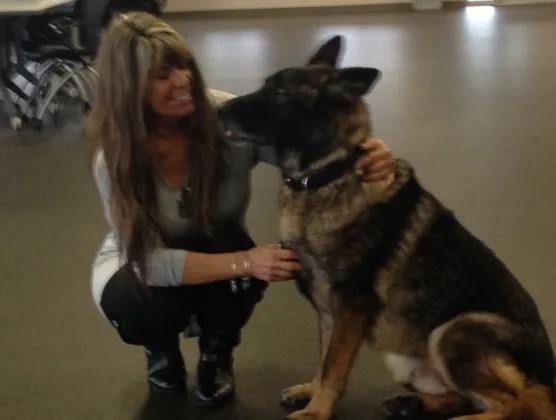
On May 22, 2021, Ashley and her oldest son took Sirius to the veterinarian to put him to sleep.
“It was the hardest thing I’ve ever done in my life,” Ashley said, beginning to cry. “Thank god my son was there, because I was there when they gave him the medication just to relax. At that point, I started crying looking in his eyes, telling him I’m so sorry. I know he trusted me. I just told him he’s going to be with his dad.”
Ashley left the room, unable to handle what was to come, while her son stayed with Sirius so he wouldn’t be alone as the veterinarian gave him the medication to put him to sleep. Ashley wept alone in her car.
“It’s still hard for me, it’s not even a year yet,” she added. “I cry all the time. He trusted me, but I didn’t know what else to do. He was suffering.”
“But it was the hardest thing I’ve ever done in my life,” she continued. “He was the last living piece of Josh.”
Sirius’s ashes are with Ashley, in her home.
Keeping a military dog handler’s story alive
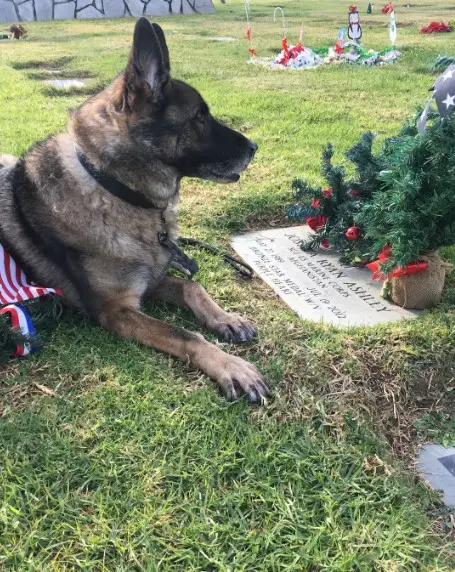
Ashley wasn’t sure if she could handle watching “Dog,” though she certainly wanted to see the film and its portrayal of the reality she has lived.
“My son said, ‘Mom, I think you’ll be OK. Let’s go,” she said. “It looked funny, and it was funny. But the hardest part was when they went to the cemetery and LuLu went to his boots and laid near his boots. And they were shooting the guns for the 21 gun salute, and (Tatum) went over and held Lulu. I used to do that with Sirius. Anytime that we were at any functions — like Memorial Day or something — and they put off the guns, I would have to do the same thing. So that part killed me.”
Still, Ashley is thankful that a movie was made about military dog handlers, who she says are often overlooked.
“Even as we were walking out the movie, there were people behind us saying, ‘That is a really good movie,'” she said. “Nobody really knows what happens to military working dogs. They don’t put them all down. You just have to give them love and kindness and let them know they’re not working dogs now, and that’s hard. But a lot of them go to former handlers or, in my case, a Gold Star mom.”
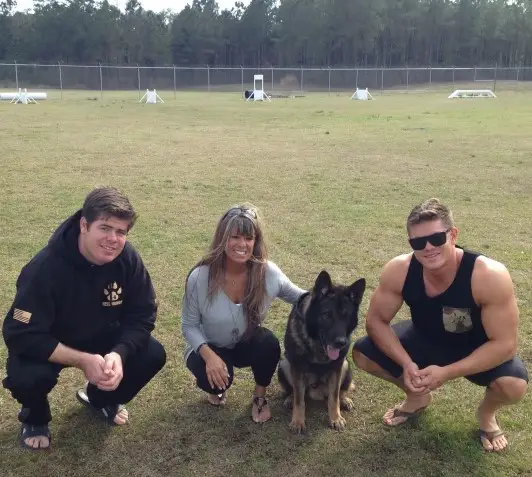
Ashley also hopes that more people will learn about military working dogs and the handlers who love them.
“Canine handlers are very special people, and I’m not just saying that because of my son,” she said. “I have close relationships with men and women that my son served with. They’re a very small community, and have a brother- and sisterhood like no other. And once my son was killed, I became part of that family.”
Source: Today

